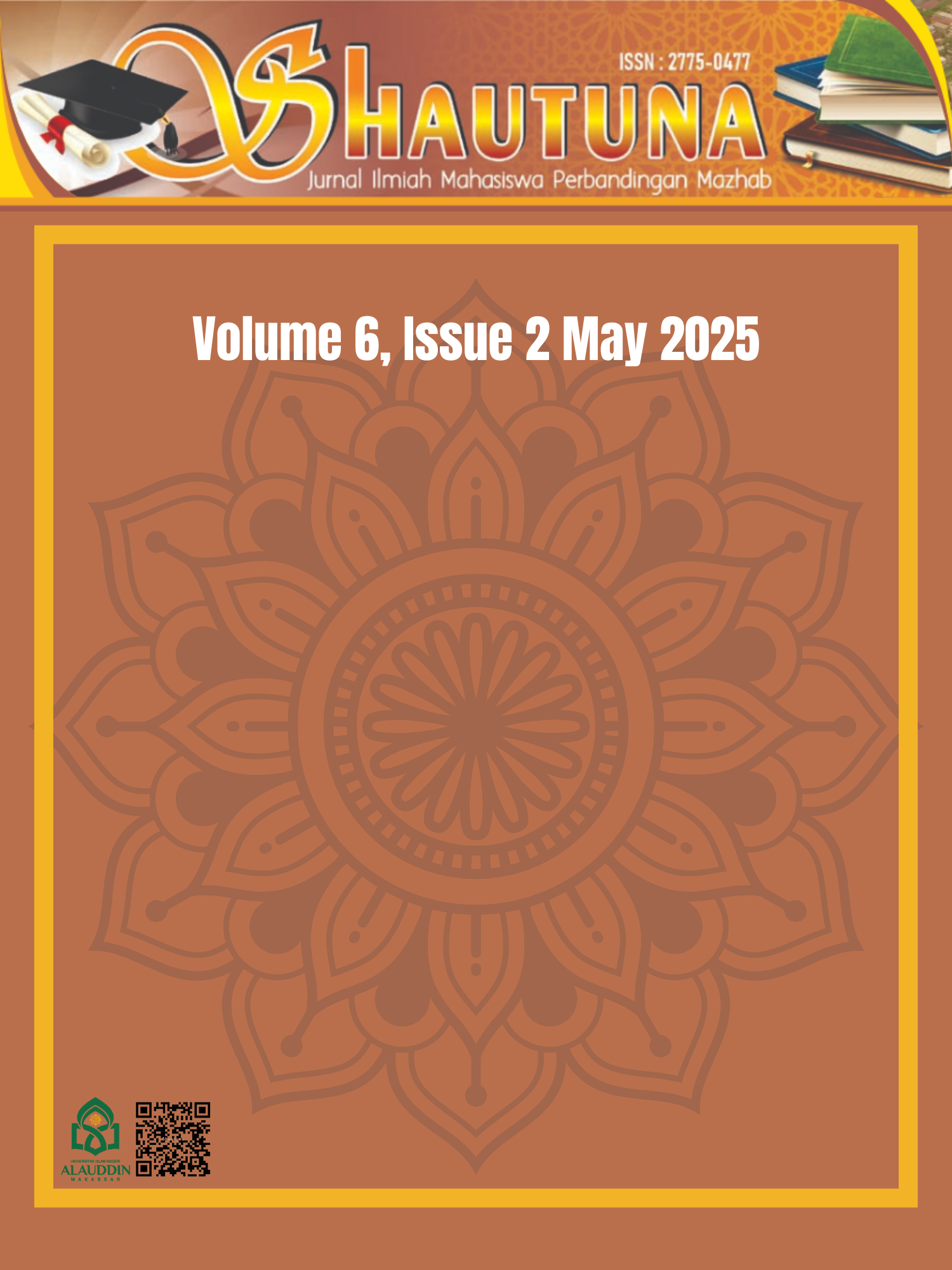Islamic Legal Evaluation of Non-Cash Capital in Livestock Partnerships
A Case Study on Mattungka Sapi in Sinjai District
DOI:
https://doi.org/10.24252/shautuna.v6i2.55420Keywords:
Islamic Legal Evaluation, Non-Cash Capital, Livestock Partnerships, Mattungka Cattle FarmingAbstract
Profit sharing is a facility that is often used by the community, including the community in Lasiai Village, East Sinjai District, Sinjai Regency. The profit sharing carried out by the people in Lasiai Village is the profit sharing "Mattungka Sapi". This study discusses the practice of implementing profit sharing in the Mattungka Sapi collaboration agreement with the community in Lasiai Village, East Sinjai District, Sinjai Regency, as well as the Mattungka Sapi production sharing cooperation system according to the views of the schools of jurisprudence (Imam of the Syafiiyah School and Imam of the Hanafiyah School). In implementing the community in Lasiai Village, it consists of two forms of cooperation, namely the village government with the community and the community with the community which uses three patterns/systems for profit sharing from mattungka cows. If viewed from the implication that the profit sharing for the mattungka cow is in accordance with the pillars and requirements of Islamic law. However, on the pillars and conditions of mudharabah applied by the people of Lasiai Village in the profit sharing of Mattungka cows, the two Imams of the Shafi'i and Hanafi schools have different views on this matter. This research is a descriptive qualitative research in the form of field research with empirical and normative juridical approaches. Data processing techniques in this study were carried out in three stages, namely data reduction, data presentation and drawing conclusions. The key informants in this study were the village government and the community in Lasiai Village, East Sinjai District, Sinjai Regency who were involved in a cooperation agreement for the production of mattungka cows. In this study it was found that, First, the implementation of the cooperation agreement for the results of mattungka sapi in Lasiai Village must be carried out with a written agreement in order to avoid disputes or disputes in the future. Second, owners and keepers are highly expected before entering into a cooperation agreement for the production of mattungka sapi, they need an understanding regarding profit-sharing rules in Islam in order to achieve justice for both parties and avoid things that can save.
References
Erianti, Desi, and Muhammad Ilham. “Implementasi Akad Mudharabah Pada Usaha Tambak Udang Di Desa Pambang Baru Ditinjau Dari Perspektif Akuntansi Syariah.” Innovative: Journal Of Social Science Research 3, no. 6 (2023): 10336–48. https://doi.org/10.31004/innovative.v3i6.7893.
Fajar, Satrio Malik, and Hartini Tahir. “Tinjauan Hukum Islam Terhadap Penerapan Bagi Hasil Dalam Sistem Tesang Di Kecamatan Pallangga Kabupaten Gowa.” Qadauna: Jurnal Ilmiah Mahasiswa Hukum Keluarga Islam 1, no. 3 (2020): 155–70. https://doi.org/10.24252/qadauna.v1i3.14749.
Fatima, Marwa, and Trisno Wardy Putra. “Analisis Implementasi Kerjasama Antara Pa’Ambi Dan Pemodal Ternak Sapi Dalam Perspektif Ekonomi Islam Di Desa Tubbi Kecamatan Tubbi Taramanu Kabupaten Polewali Mandar.” Bertuah Jurnal Syariah Dan Ekonomi Islam 5, no. 1 (2024): 181–200. https://ejournal.kampusmelayu.ac.id/index.php/Bertuah/article/view/939.
Hudayanti, Sri, and Muhammad Sabir. “Bagi Hasil Tenaga Kerja Dalam Bidang Pertanian Di Desa Bontoramba Kecamatan Pallangga Kabupaten Gowa ; Perspektif Mazhab Hambali.” Shautuna: Jurnal Ilmiah Mahasiswa Perbandingan Mazhab 3, no. 1 (2022): 232–49. https://doi.org/10.24252/shautuna.vi.24443.
Mahdi, Muammar, and Irfan Lewa. “Pandangan Imam Mazhab Terhadap Wali Bagi Janda Relvansinya Dengan Kompilasi Hukum Islam Di Indonesia ; Studi Komparatif.” Shautuna: Jurnal Ilmiah Mahasisawa Perbandingan Mazhab 2, no. 3 (2021): 820–27. https://doi.org/10.24252/shautuna.v2i3.23237.
Marzuki, Sitti Nikmah. “Praktek Pengembangan Bagi Hasil Peternakan Sapi Masyarakat Kecamatan Barebbo Kabupaten Bone Sulawesi Selatan.” Islamiconomic: Jurnal Ekonomi Islam 10, no. 1 (2019): 103–26. https://doi.org/10.32678/ijei.v10i1.115.
Musaiyana, Musaiyana, R Ira Laksana Dewi, Oyo Sunaryo Mukhlas, and Atang Abd Hakim. “Pandangan Terkait Riba, Bunga Bank, Serta Sistem Bagi Hasil Menurut Ulama Klasik Dan Ulama Kontemporer.” PESHUM: Jurnal Pendidikan, Sosial Dan Humaniora 4, no. 2 (2025): 1826–37. https://doi.org/10.56799/peshum.v4i2.7146.
Qardhawi, Syauqas. “Pelaksanaan Sistem Bagi Hasil (Mawah) Dalam Akad Mudharabah Pada Peternak Sapi Di Gampong Pango Raya Kecamatan Ulee Kareng Banda Aceh.” UIN Ar-Raniry Banda Aceh, 2019.
Rengganis, Agiet Mutiara, Marliyah Marliyah, and Wahyu Syarvina. “Analisis Penerapan Bagi Hasil Dalam Sistem Paro Pada Masyarakat Peternak Sapi Di Kabupaten Asahan.” Jurnal Ilmiah Ekonomi Islam 9, no. 2 (2023): 2854–62. https://doi.org/10.29040/jiei.v9i2.8830.
Rosmiyati, Rosmiyati, and M Thahir Maloko. “Akad Muzara’ah Pertanian Padi Dalam Perspektif Hukum Ekonomi Syariah.” El-Iqthisady: Jurnal Hukum Ekonomi Syariah 3, no. 2 (2021): 166–76. https://doi.org/10.24252/el-iqthisady.v0i0.26067.
Siregar, Pani Akhiruddin, Suryani Suryani, and Juwita Silalahi. “Tinjauan Hukum Islam Terhadap Praktik Bagi Hasil Pada Hewan Ternak Kambing.” Jurnal Hukum Ekonomi Syariah 5, no. 2 (2022): 117–34. https://doi.org/10.30595/jhes.v5i2.12373.
Sofi, Ahmad Sofi. “Implementasi Sistem Bagi Hasil (Mudharabah) Ternak Sapi Dalam Perspektif Ekonomi Islam (Pada Kelompok Ternak Di Dusun Rowo Desa Karang Paiton Kecamatan Ledokombo Kabupaten Jember).” UIN Kiai Haji Achmad Siddiq Jember, 2023. https://digilib.uinkhas.ac.id/25867/.
Sohrah, Sohrah. “Tinjauan Hukum Islam Terhadap Bagi Hasil Dalam Perjanjian Kerja Sama Peternakan Sapi.” Iqtishaduna: Jurnal Ilmiah Mahasiswa Hukum Ekonomi Syari’ah 1, no. 4 (2020): 253–58. https://doi.org/10.24252/iqtishaduna.v2i3.18461.
Susana, Erni, and Annisa Prasetyanti. “Pelaksanaan Dan Sistem Bagi Hasil Pembiayaan Al-Mudharabah Pada Bank Syariah.” Jurnal Keuangan Dan Perbankan 15, no. 3 (2011): 466–478. https://doi.org/10.26905/jkdp.v15i3.1039.
Wijaya, Abdi. “Respon Lembaga Fatwa Terhadap Isu Fikih Kontemporer (Studi Komparatif Lembaga Fatwa MUI, Majelis Tarjih Muhammadiyah Dan Bahtsul Masail NU).” Mazahibuna: Jurnal Perbandingan Mazhab 1, no. 2 (2019): 180–99. https://doi.org/10.24252/mh.v1i2.10624.
Interview
Abib (45 years old). Head of Lasiai Village. Interview. 2024.
Hasyim (30 years old). Cattle Ranchers (Community Stores). Interview. 2024.
Syamsul Mu'min (45 years old). Village Secretary and Person in Charge of the Village Government. Interview. 2024.
Risnawati (40 years old). Person in Charge of Village Funds. Interview. 2024.
Anton (35 years old). Cattle Breeders. Interview. 2024.
Anwar (40 years old). Traditional Leaders and Cattle Owners. Interview. 2024.
Downloads
Published
How to Cite
Issue
Section
License
Copyright (c) 2025 Nurfadillah Arsyad, Raines Indah Mutiara Amelia, Abdul Rahman Qayum

This work is licensed under a Creative Commons Attribution 4.0 International License.









